#cw for religion
Explore tagged Tumblr posts
Text
Gender Nonconforming Jesus: A look at art history. CW: religion, transphobia, artistic nudity, depictions of open wounds (Long post)
Here’s a link to the original comic: Trans Jesus


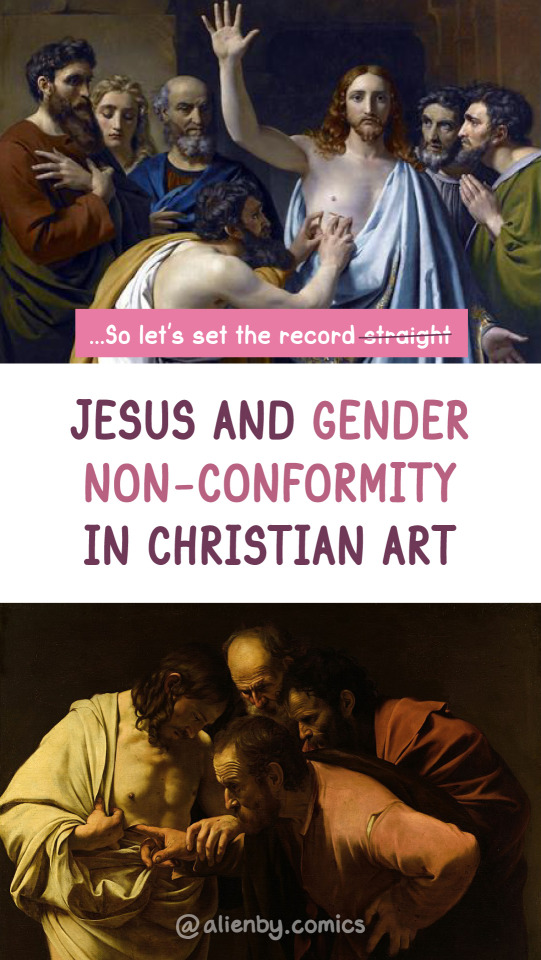

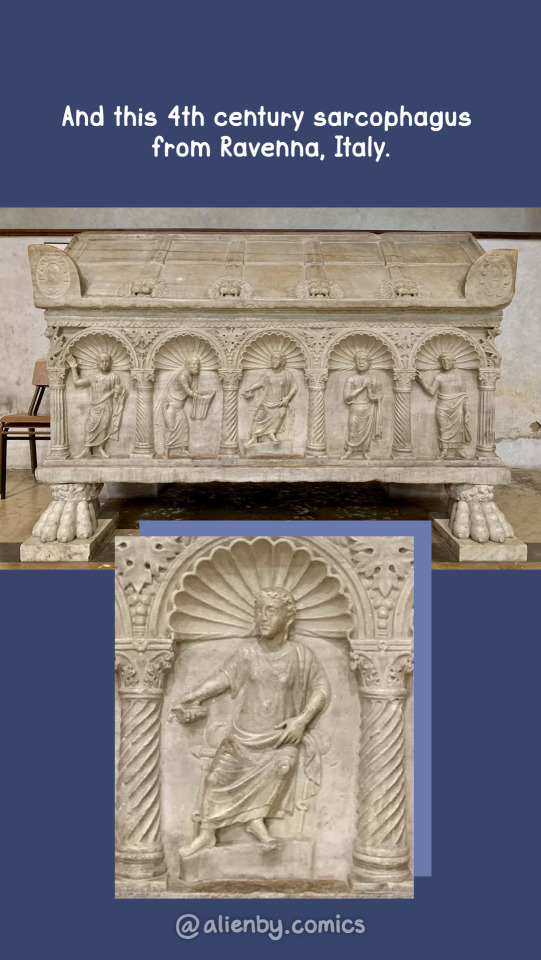


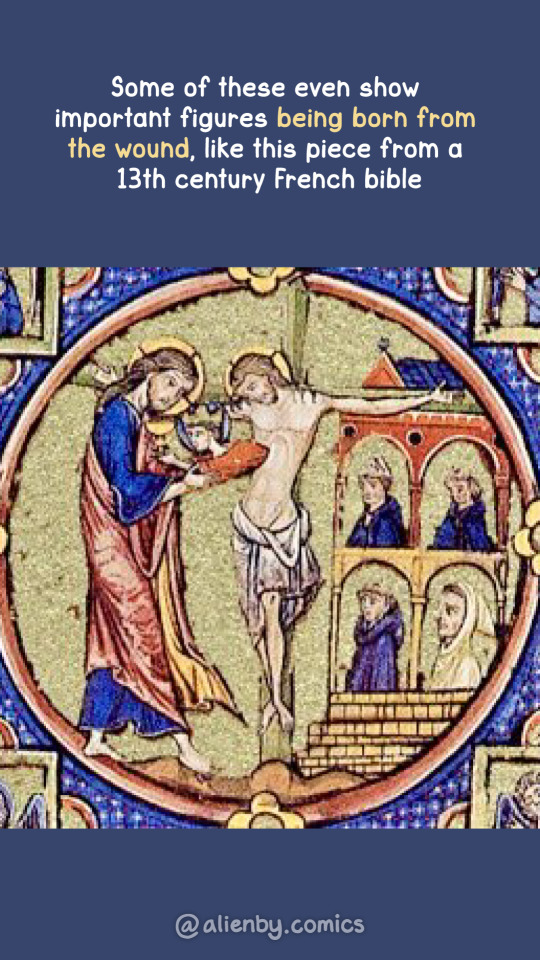

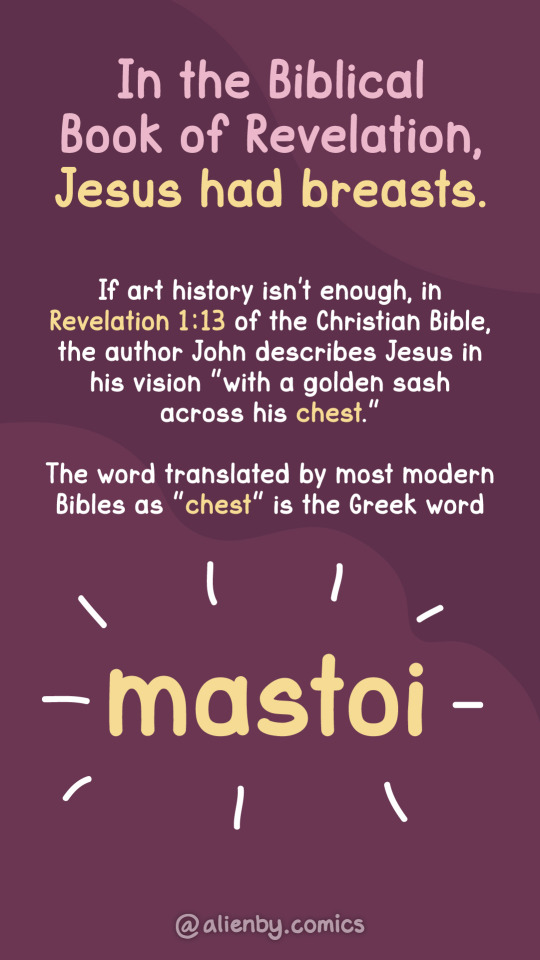
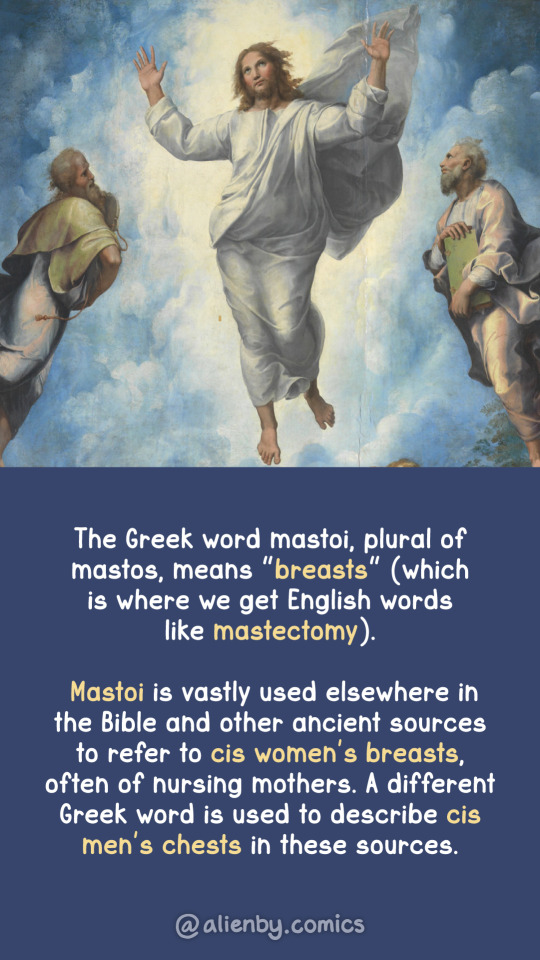
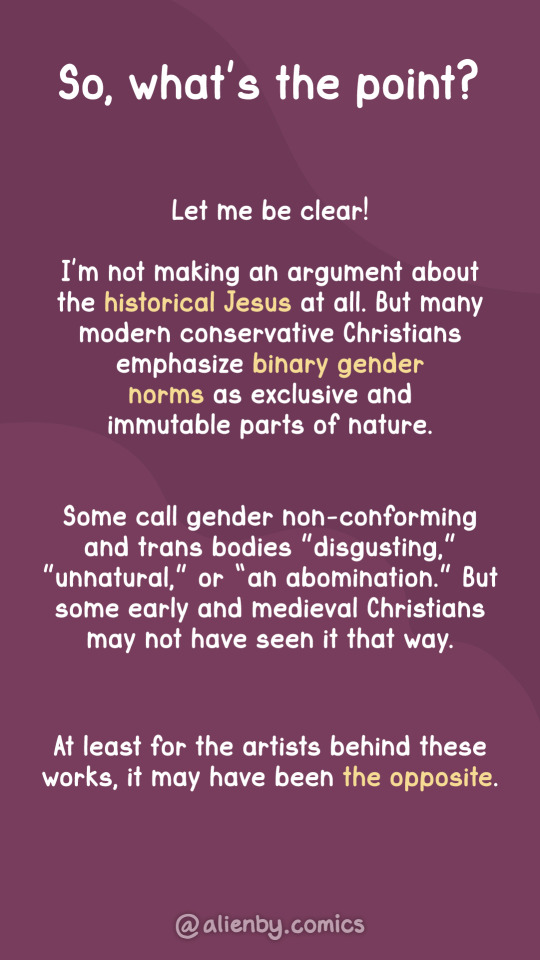
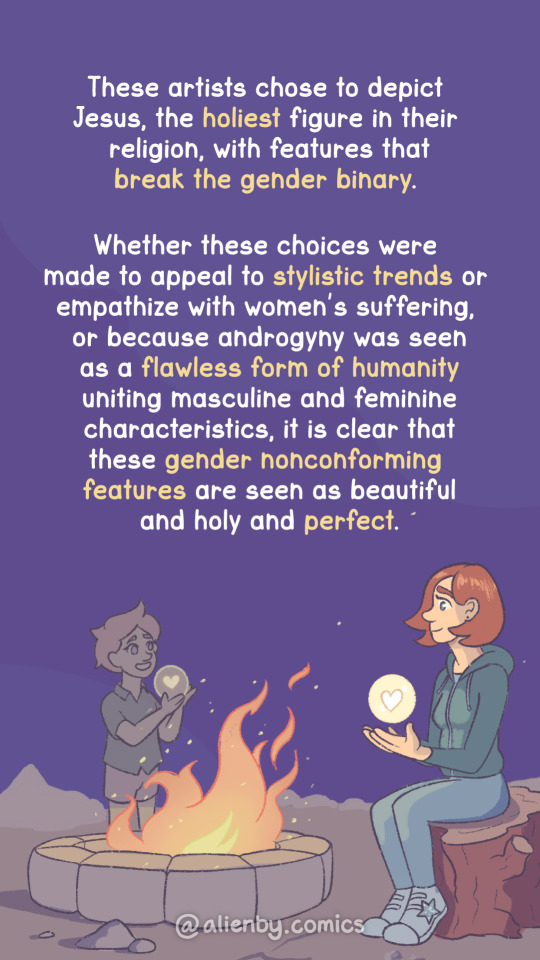

#long post#trans woman#trans man#transgender#cw transphobes#cw wounds#cw religion#exvangelical#ex fundamentalist#ex religious#art history#trans artist#transfem#trans history#lgbtq history#gender nonconforming#cw artistic nudity
24K notes
·
View notes
Text
dear god please take all the pain from every female member of the dsmp, double it, and give it to dream was taken. amen & godbless
2K notes
·
View notes
Text
Nobody was doing it like Mary Magdalene. Tits out. Standing on a mountain. Holding a skull. She’s like the lesbian catholic hamlet. Aesthetically an absolute win for the gays.
#mary magdalene#I’m queueing this at 3am deliriously ignore me#the VIBES though….iconic#religion#cw christianity
7K notes
·
View notes
Text

happy pride :3 i offer religious trauma
#hazbin hotel fanart#hazbin hotel#chaggie#charlie morningstar#vaggie#zenta draws#cw religion#hooo boyyyyh i would happily talk about vaggie all day#so much potential in her character… i need to know more about what goes on in her brain#like you can’t tell me she isn’t chock full of religious trauma#and confusion#and like#[waves arms]#SCREAMING#i judt know that the first time they did the horizontal hokey pokey#she stayed up all night questioning her enture existence
4K notes
·
View notes
Text

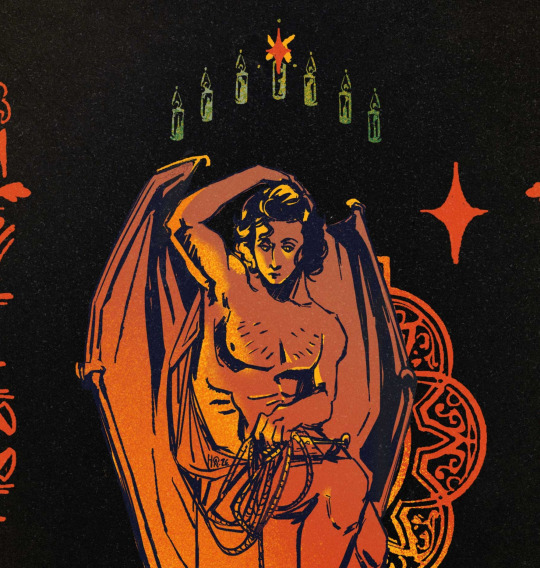


sain't
INPRNT
#I committed blasphemy on this one#please feel free to use comments section#if I had a bible... it would be this cover#i'm going to hell#cw: religious themes#cw: religion#hazeilus#angel armand#iwtv season 2#amc iwtv#interview with the vampire#digital drawing#fanart#vampire armand#gay vampires#iwtv season 2 fanart#illustration#iwtv fanart#iwtv art#iwtv s3 fanart#the vampire armand#armand fanart#devil armand#armand nation
1K notes
·
View notes
Text
Sorry I'm still on The Implications of severance and religion. Because Innie Burt has a different faith from Outie Burt. The only God Burt G has ever known is Kier, the only doctrine is the handbook- which he broke. By the circumstances of the world he lived in he is a capital 's' Sinner. He cannot beg forgiveness - from Kier or anyone else. He cannot atone. He was punished with non-existence for holding a man's hand and he is gone now. Is he judged by the doctrine of God or the doctrine of Kier? In either case, does he actually make the cut? Is his soul only released once his body dies or is he already in whatever afterlife Outie Burt hopes is waiting for him?
Do you think Burt Goodman prays for his Innie? Do you think he fears he's damned them both to hell?
#severance#severance spoilers#severance season 2#AHHHHH#SCREAMMINNNGGG#listen. im not especially religious anymore. but religion will always be one of those things i have a DEEP interest in and UGH#the IMPLICATIONS#so juicy. yum yum#irving b#cw religion#cw christianity#burt goodman#fields goodman
1K notes
·
View notes
Text
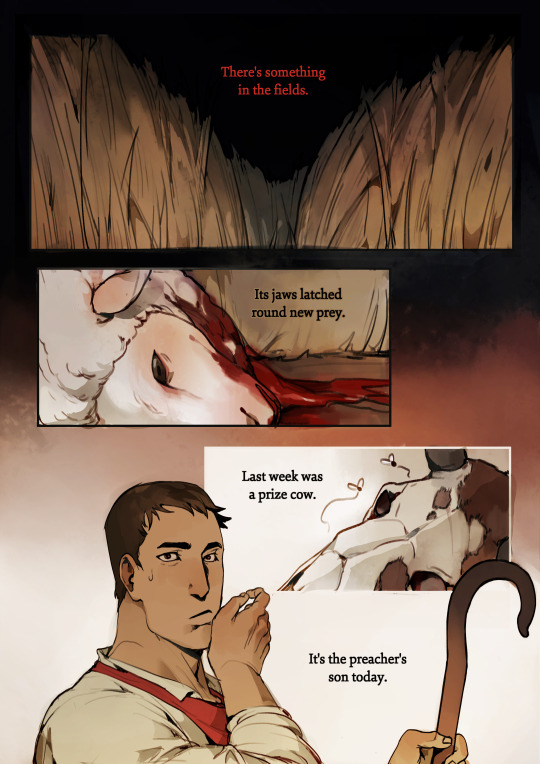

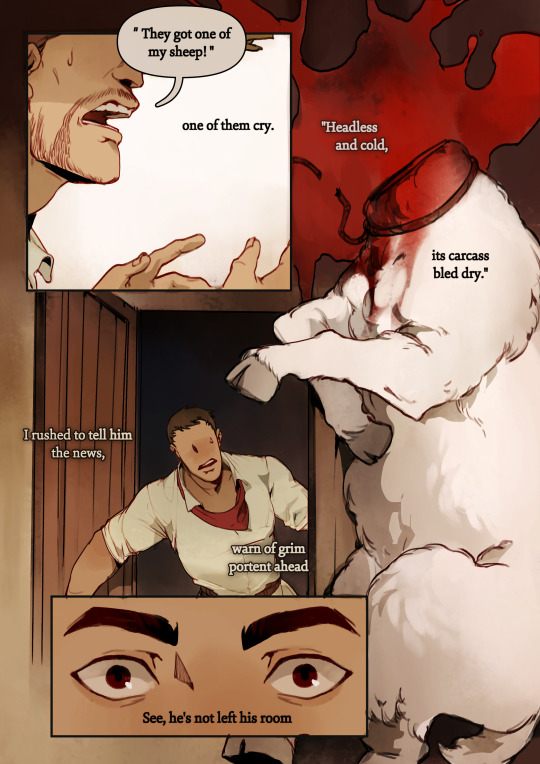

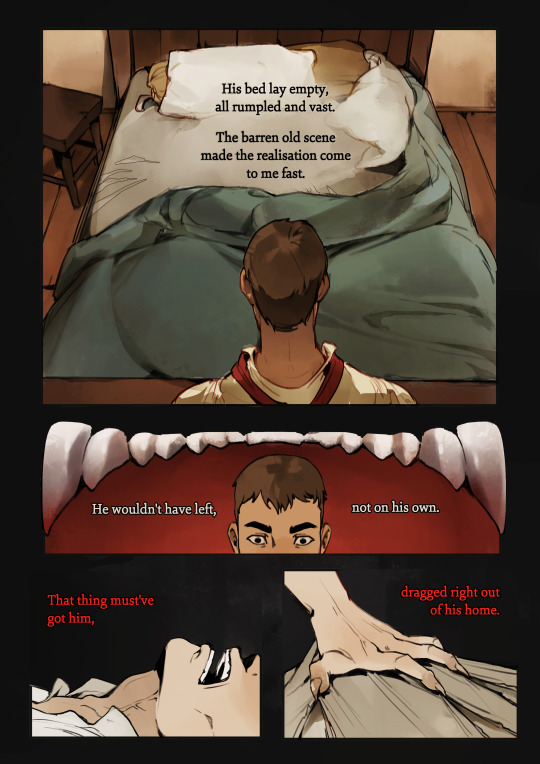
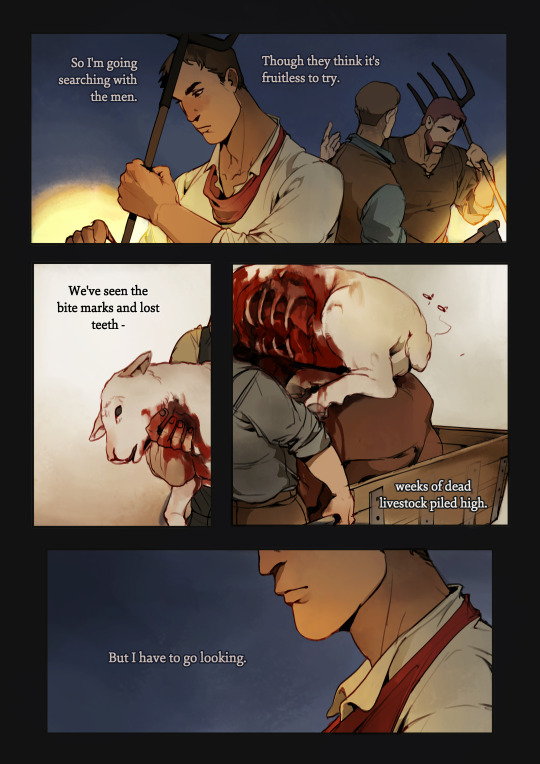
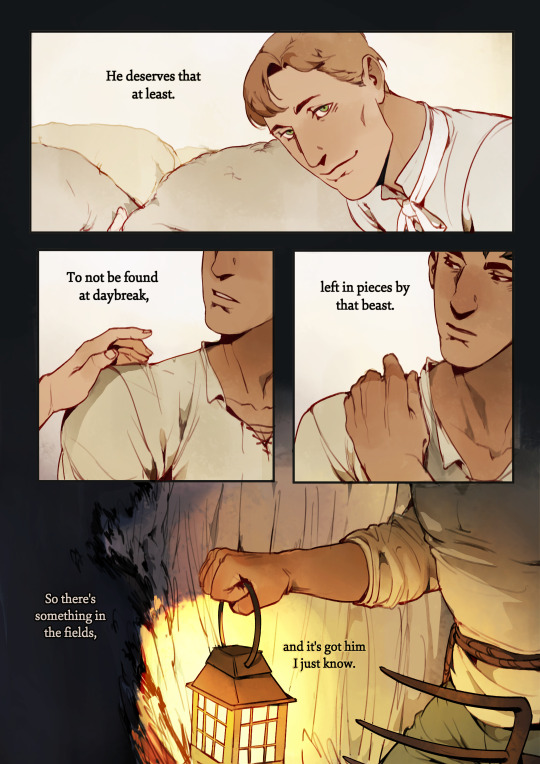
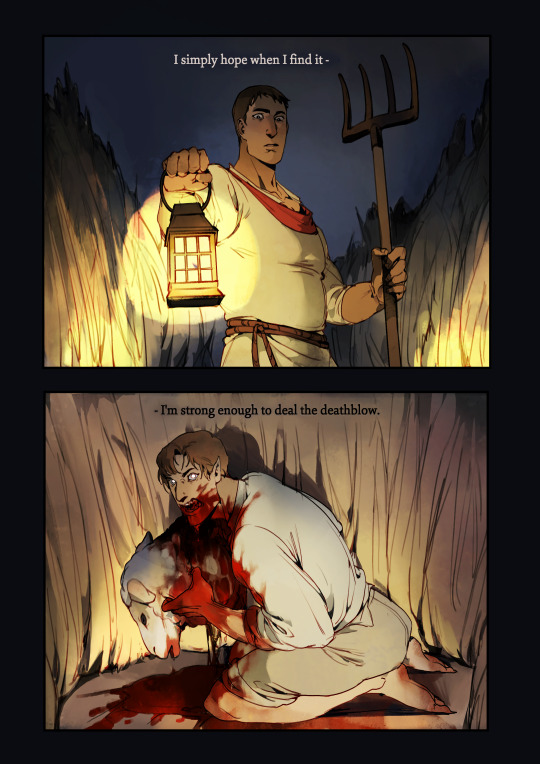
the fields.
a comic about sheep.
--
creative notes:
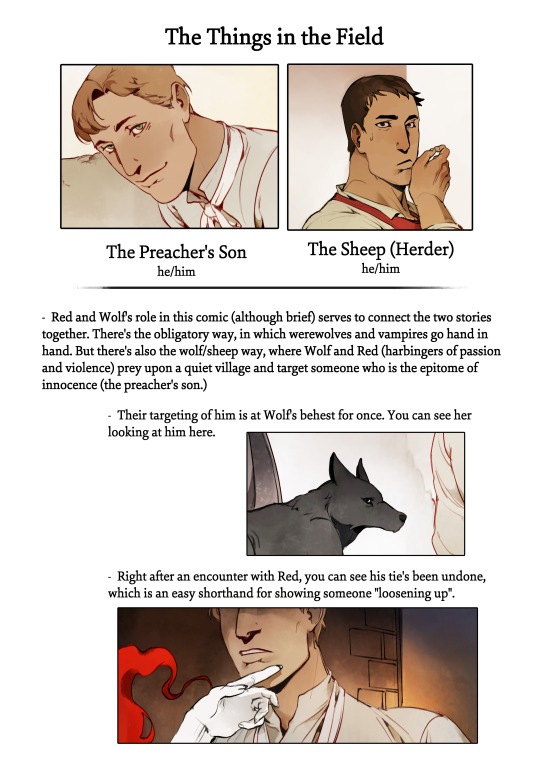

--
The collection this comic is part of is available to buy now! 100% of profits will be donated to Medical Aid for Palestinians, the PCRF and CareforGaza in a 40/40/20 split.
BUY HEART-EATERS NOW
#cw: religion#cw: blood#cw: animal death and gore#although it is very stylised#vampires and werewolves how very original#listen#vampires have spent too long being typecast as fancy little fruits#let them be small-town horrors for once#thank you btw. for being patient with me#im afraid ive probably lost a lot of momentum seeing as how this last comic has been overdue by almost 4 months#but i hope people can understand why ive been less passionate about making comics regarding. everything.#in any case#thank you for your patience#thank you for your support#and as always#thank you for reading#stillindigo comics#stillindigo art#hearteaters
6K notes
·
View notes
Text
One of the biggest eye-openers for me back when a I went to church was that like…
Oh man how do I explain it.
There’s this prevalent idea I see a lot in Christian circles that if you pray right, if you follow God correctly, if you’re a truly virtuous person, your problems will be solved, right?
If you suffer, if you fall ill, if bad things happen, it’s because you aren’t good enough. You don’t need medicine because if you’re worthy, if you’re faithful enough, God will reward you by healing you. Right?
But like. Discussing this with my mother, and travelling out east with our pastor… Jesus didn’t spend all his time with perfect, virtuous people. Jesus didn’t seek out and heal well-to-do, faithful, perfect Christians. In fact, there’s a specific story in which he straight up doesn’t travel out to heal a believer’s dying daughter, because she’s already “saved”. Her earthy death is okay because she’s going to heaven already.
And like… coming from our Pastor, who is one of the best guys I’ve ever met- there seems to be an ongoing, underlying message of, “Jesus doesn’t care about you if you’re a good Christian”. If you’re a good Christian, if you’re living a virtuous life on earth, then any suffering you experience is only temporary- your ETERNITY is secure. Jesus goes out of his way to meet with sinners and the unfaithful because those are the people whose souls are in danger.
So like. In that perspective, being good doesn’t make your life better, it’s just good for others and good for your soul. Praying and doing good probably won’t cure your cancer, but it may mean you don’t have to worry too much about your death.
And like. I dunno. I wouldn’t call myself a Christian, but I find myself thinking about that concept a lot
Does suffering mean you deserve a reward?
Is suffering proof that you’re unworthy?
Or is suffering just an unfortunate facet of life that doesn’t reflect on your worth, that you still have to deal with as best you can?
Maybe suffering is just suffering.
Maybe the bad things you experienced weren’t about you
And maybe you just gotta try your best and be kind anyways, so you can rest easy when you go
800 notes
·
View notes
Text
Oh so when a priest takes an oath of celibacy he's "a man of faith", but when I say I'm Ace and sex-repulsed I'll "change my mind" and "haven't found the right person yet" 🙄
#asexual#acespec#ace pride#asexuel#lgbt#lgbtq#lgbtqia#lgbt pride#lgbtq community#actually asexual#asexual representation#asexual rant#asexual rights#aromantic#aromantism#aromance#arospec#aromantic representation#aromantic rant#aromantic rights#incoherent mumbling#tw religion#cw religion
1K notes
·
View notes
Text
A Guide to the Chinese Underworld (and what it isn't)
As many FSYY and fox posts as there were on my blog, I am actually a huge fan of the Chinese Underworld mythos. Mostly because I was once a morbid little kid that loved reading about the excavations of ancient tombs, and found the statues depicting hellish torture in the Haw Par Villa "super cool".
Apart from the aesthetics, the history of its evolution is also fascinating. Most of us, Chinese or not, only know the most popular version of the Underworld——the "Ten Kings" system, yet that isn't always the case. So today, I'll start off with a short summary of that.
In pre-Qin era, there was already this generic idea of a "Realm of the Dead" called the Yellow Spring, Youdu, or Youming, but we know very little about it.
Then, in the Han dynasty, two ideas start to emerge: 1) the Underworld is a bureaucracy, 2) the God of Mt. Tai ruled over the dead.
This early bureaucracy might not function as an agent of punishment; the main focus was on keeping the dead segregated from the living so they wouldn't bring diseases and misfortune to the latter, as well as using those ghosts to enforce collective punishments upon people for their lineage's wrongdoings while they were still alive.
Post-Han, after Buddhism entered China and took root, its idea of karmic punishments and reincarnation and the figure of King Yama was merged with folk and Daoist ideas of the Underworld bureaucracy, and, came Tang dynasty, resulted in the "Ten Kings" system that first appeared in Dunhuang manuscripts.
It was very rudimentary and far from well-established, as seen in Tang legends, with some adopting the Ten Kings system, some sticking to the Lord of Mt. Tai and some favoring King Yama, and overall little agreements on who's in charge of the Underworld.
But the "Ten Kings" system would become the mainstream version from then onwards, used in Ming vernacular novels and made even more popular by folk religion scrolls like the Jade Records (Yuli Baochao).
As such, most points in the following sections will be based on the fully matured "Ten Kings" system of the Underworld, as seen in the Jade Records and JTTW.
What happens when you die?
(This is a fictionalized walkthrough of the posthumous fate of souls under the "Ten Kings" system. I try to stick to the very broad progression outlined in the Jade Records, but many creative liberties are taken on the details.)
Let's say there's a guy named Xiao Ming, and he had just died of a heart attack. Bummers. What now?
Well, the first thing he saw would be the ghost cops.
There isn't really an unanimous agreement on who these ghost cops are: they may be a pair of ghosts in white and black robes, wearing tall hats (Heibai Wuchang), they may have the heads of farm animals (Ox-Head and Horse-Face), or they can just be generic ghost bureaucrats. For convenience's sake, let's say it was the first scenario.
"Who are you guys and where are you taking me?"
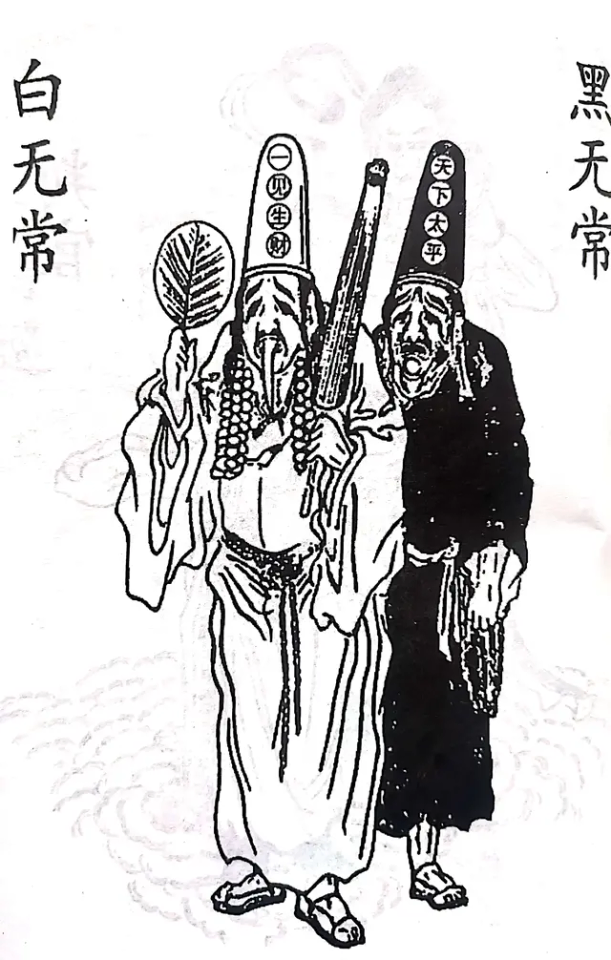
"Glad you asked!" The taller ghost cop, being the cheerful one of the pair, replied. It wasn't very reassuring, considering that his tongue was dangling out of his mouth way further than it should. "I'm the White Impermanence, my sour-looking colleague here is the Black Impermanence, and we are taking you to the City God's office."
This City God, a.k.a. Chenghuang, is just like how it sounds: the divine guardian of a city, who also pulls double duty as the head of the local Dead People Customs Office. They are usually virtuous officials deified posthumously, and in JTTW, they fall under the category of "Ghostly immortals", together with the Earth Gods a.k.a. Tudi.
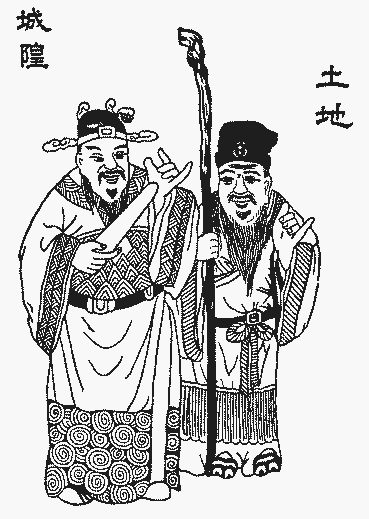
So Xiao Ming went with the two ghost cops——not like he had much of a choice, made his way through the long queue at the City God's office, and was now standing in front of a gruff old magistrate in traditional robes.
"Name?"
"Wang Xiao Ming."
"Age and birth dates?"
"21, April 16 2003…"
After he was done asking questions, the City God flipped through his ledger, then picked up a brush, ticked off Xiao Ming's name, and told him to go get his pass in the next room. More waiting in a queue. Wonderful.
"I never heard anything about needing a pass to get to the Underworld," the girl in front of Xiao Ming asked the ghost cops, who were standing guard nearby. "Is this a new policy or something?"
"Yeah. In the old days, we'd just drag y'all straight to the Ghost Gate." The ghost cop in black said, then muttered to himself, "Fuckin' paperworks and overpopulation, man…"
(This "Dead People Passport" thing was popularized in the middle-to-late Ming dynasty, as shown by the discovery of such documents inside tombs in southern China. )
(It might have evolved from similar passes to the Western Pure Land in lay Buddhism that recorded their acts of merits. Which, in turn, might be traced back to the "Dead People Belongings List" of Han dynasty, to be shown to Underworld bureaucrats so that no one would take away the dead's private property down there or something.)
Anyways, after he received his pass, Xiao Ming departed together with the rest of the bunch, to be led to the Ghost Gate. It was like the world's most depressing tourist group, where instead of tour guides, you got two ghost cops in funny hats, and the only scenery in sight was the desolation of the Yellow Spring Road.
They weren't the only travellers on the road, though. Xiao Ming noticed other groups moving in the far distance, behind the fog and the flickering ghostfire, led by similar figures in black and white.
It made a lot of sense; realistically, there was no way two ghost cops could fetch hundreds of thousands of dead people all by themselves.
(SEA Tang-ki mediums believed there were multiple Tua Di Ya Peks——Hokkien name for the Black and White Impermanences, working for different Underworld Courts.)
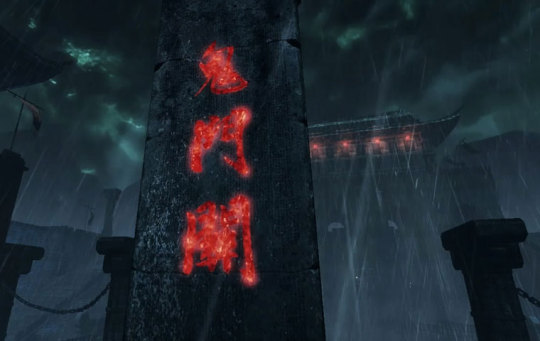
At last, the Ghost Gate stood in front of Xiao Ming, guarded by two towering figures. Normally, they'd be Ox-Head and Horse-Face, like what you see at Haw Par Villa's Underworld entrance.
However, older Han dynasty works like Wang Chong's 论衡·订鬼 also mentioned two gods, Shenshu and Yulei, as guardians of the Ghost Gate, who would use reed ropes to capture malicious ghosts and feed them to tigers, making them possibly the earliest incarnation of "Gate Gods".
So here, they were what Xiao Ming sees, standing side by side like proper doormen, silently watching herds of ghosts being funneled through the entrance.
The place was more crowded than a train station during the CNY Spring Rush; the ghost cops had already said their quick goodbye and left to fetch the next group of dead people, leaving the resident officials of the Underworld proper to maintain order and quell any would-be riots.
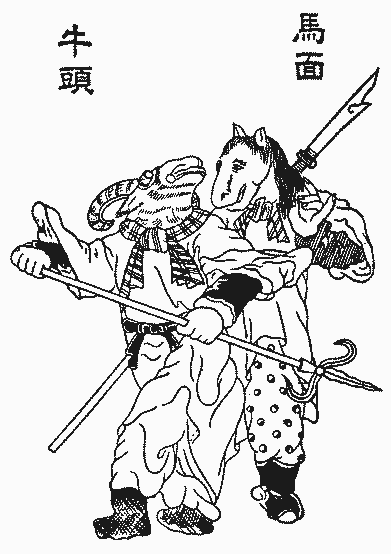
Now you started seeing the Ox-Head and Horse-Face guys, poking at unruly ghosts with their pitchforks and dragging away the violent ones in chains. Among their ranks were other monstrous beings, blue-faced yakshas and imps, but also regular dead humans who look 100% done with their jobs, like the lady who stamped Xiao Ming's pass when it was finally his turn.
After this point, Xiao Ming had entered the Underworld proper, and his next destination would be the First Court, led by King Qin'guang. Here, his fate should be decided by what is revealed in the King's magical mirror.
If Xiao Ming was a good guy, or someone who had done an equal amount of good and bad things in life, he'd be sent straight to the Tenth Court for reincarnation. However, if the mirror, while replaying his life events, had displayed more evil deeds than good ones, he'd be sent to one of the 2nd-9th Courts for judgment and then punished inside the Eighteen Hells.
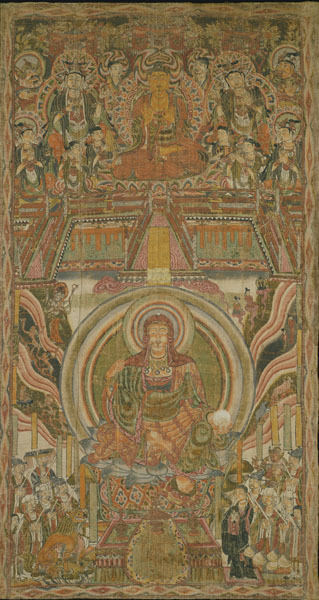
Each of the Ten Kings was also assisted by ghostly judges. Many of them were righteous and just officials in life who had been recruited into the Ten Courts posthumously——Cui Jue from JTTW is one such example, while others were living people working part-time for the Underworld, like how Wei Zheng, Taizong's minister, works part-time for the Celestial Bureaucracy in JTTW.
We decide to be nice to Xiao Ming, so, after reliving some embarrassing childhood incidents and cringy teenage phases in front of a bunch of dead bureaucrats, he was found innocent and sent to the Tenth Court.
The queue here was almost as long as the First Court's, stretching on and on alongside of the banks of the Nai River. King of the Turning Wheel made his judgment without even lifting his head when it was Xiao Ming's turn:
"Path of Humans, male, healthy in body and mind, ordinary family. Next!"
Exiting the Tenth Court building, Xiao Ming saw the Terrace of Forgetfulness, standing tall before six bridges, made of gold, silver, jade, stone, wood, and…some unidentified material. Before he could get a good look at them and the little dots moving across those bridges, he was hurried into the Terrace by the ghostly officials.
Now, both JTTW and the Jade Records mention multiple bridges across the Nai River. In the former, there is 3, and the latter, 6. The bridges made of precious materials are for people who will reincarnate into better lives, as the wealthy, the fortunate, and the divine, while the Naihe Bridge is either the common option or the terribad shitty option.
However, the Naihe Bridge proved to be so iconic, it became THE bridge you walk across to reincarnate in popular legends.
Anyways, back to Xiao Ming. He found himself standing in a giant soup kitchen of sorts, with an old lady at the counter, scooping soup out of her steaming pot and into one cup after another.
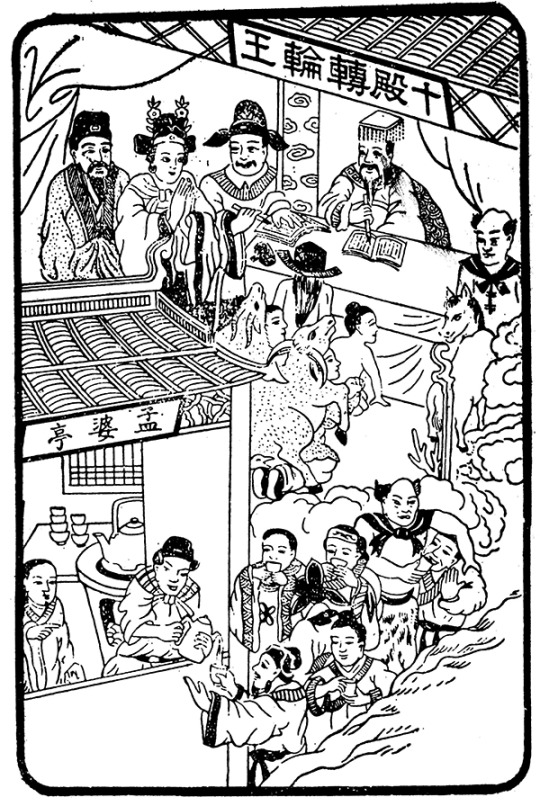
This is Mengpo, the amnesia soup granny; according to the Jade Records, she was born in the Western Han era, and a pious cultivator who thought of neither the past nor the future, only knowing that her surname was Meng.
Made into an Underworld god by the Jade Emperor, she cooks a soup of five flavors that will wipe the memory of the dead, making sure they do not remember any of their past lives once they reincarnate.
It tastes awful. Like what you get after pouring corn syrup, coffee, chilli sauce, lemon juice and seawater into the same cup.
Such was Xiao Ming's last thought, as he gulped down the soup, and then he knew no more.
Things you should know about the Chinese Underworld:
1. It's not the Christian Hell.
Rather, the Chinese Underworld functions somewhat like the Purgatory, in that there are a lot of torment, but the torment's not eternal, however long the duration may be. Once you finish your sentence, you get reincarnated as something else, though that "something else" is not a guaranteed good birth.
Other people can also speed up the process via transferring of merits: hiring a priest/monk to chant sutras and perform rituals, for example, or performing good deeds in life in dedication to the dead, or they can pray to a Daoist/Buddhist deity to save their loved ones from a dreadful fate.
Interestingly enough, a thesis paper I read mentions that, whereas Buddhist salvation from the Hells was based on transference of merits——you give monks offerings and pay them to chant sutras, so they can cancel out the sinners' bad karma with good ones, Daoist ideas of salvation tend to involve the priest going down there, sorting it out with the Underworld officials, and taking the dead out of the Hells themselves.
(The paper also stops at the Northern-Southern and Tang dynasties, so the above is likely period-specific.)
2. Nor is it run by evil demons.
Underworld officials are not nice guys and look pretty monstrous and torture the sinful dead, but they are not the embodiment of evil. Rather, the faction as a whole is what I'd call Lawful Neutral, who function on this "An Eye for An Eye" logic, where every harm the sinner caused in life must be returned to them, in order for their karmic debts to be cleansed and move on to their next life.
They can absolutely be corrupt and incompetent and take bribes——Tang dynasty Zhiguai tales and Qing folklore compendiums featured plenty of such cases, but that's a very mundane and human kind of evil, not a cosmic/innate one.
This is just my personal opinion, but if you want to do an "evil" Chinese Underworld? It should be a very bureaucratic evil, whose leaders are bootlickers to the higher-ups, slavedrivers to their rank-and-file workers, and bullies who abuse their power over regular dead people.
Not, y'know, Satan and his infernal legions or conspiring Cthulu cultists.
3. The Ten Kings are not Hades.
Make no mistake, they still have a lot of power over your average dead mortal. But in the grand scheme of things? They are the backwater department of the pantheon, who only show up in JTTW to get pushed around and revive the occasional dead people.
When Taizong made his trip to the Underworld, the Ten Kings greeted him as equals——kings of ghosts to the king of the living. If they see themselves as equal in status to a mortal emperor, then, like any mortal emperors, they are subordinate to the Celestial Host, and the balance of power is not even remotely equal or in their favor.
Also, it isn't said outright, but under the Zhong-Lv classification of immortals JTTW is using, Underworld officials will likely be considered Ghostly immortals, the lowest and weakest of the five types, much like Tudis and Chenghuangs.
Essentially: they are ghosts that are powerful enough to not reincarnate and linger on and on, spirits of pure Yin as opposed to true immortals, who are beings of pure Yang.
It's pretty much the shittiest form of immortality, the result you get when you try to speedrun cultivation (the Zhong-Lv text also made a dig at Buddhist meditation here), and if they don't reincarnate or regain a physical body, there is no chance of progressing any further.
Oh, and fun fact? In the Song dynasty, commoners and literati elites alike believed that virtuous officials in life would get appointed as ghostly officials in death.
However, the latter viewed it as a punishment. Which was strange, considering how they still held the same position and the same amount of authority, just over dead people instead of living ones, so there should be no big losses, right?
Well...it was precisely the "dead people" part that made it a punishment. See, a lot of the power and prestige they had as officials came from the benefits they could bring to their families and kins and native places, as well as the potential wealth and reputation bonuses for themselves.
A job in the Dead People Supreme Court would give them the same workload, but with none of those benefits. Since all the dead people had to reincarnate eventually, they couldn't have a fixed group as their power base, or keep their old familial ties and connections. At most, they could help out an occasional dead relative or two.
Like, working for the Underworld Courts was the kind of deadend (no pun intended) job not even living officials wanted for themselves in the afterlife. That's how hilariously sad and pathetic they are.
4. In JTTW at least, they aren't even the highest authorities of the Underworld.
That would be Bodhisattva Ksitigarbha, who is technically their boss, though he seems to be more of a spiritual leader than someone who is actually involved in running the bureaucracy.
Which makes sense, since he has sworn an oath to not attain Buddhahood until all Hells are empty, and his role is to offer relief and salvation to the suffering souls, not judging and punishing them.
Now, historically...even though Ksitigarbha in early Tang legends was still the savior of the dead, he seemed to be unable to interfere with the judicial process of the Underworld, merely showing up to take people away before they were judged by King Yama.
However, in the mid-Tang apocryphal "Sutra of Bodhisattva Ksitigarbha" (地藏菩萨经), he had evolved into the equal of King Yama, with the power of supervision over his judgements. By the time the Scripture on the Ten Kings came out, in artistic depictions, the Ten Kings had become fully subservient to him.
5. Diyu usually refers to the prison-torture chamber part, not the courthouse, nor is it the entirety of the Underworld.
And for the majority of souls that haven't committed crimes, they'll only see the courthouse part before they are sent to reincarnation. That's why I personally don't like, or use the name Diyu for the Chinese Underworld: I prefer the term Difu ("Earth Mansions"), which encompasses the whole realm better.
Also: even though historical sources like the Scripture on the Ten Kings and Jade Records seem to suggest that the dead were just funneled through this Courthouse-Prison-Reincarnation pipeline with no breaks in between, in practice, that isn't the case.
According to popular folk beliefs, after the dead were done with their trials/sentences, they stayed in the Underworld for a period of time and led regular lives, while functioning as ancestor spirits and receiving offerings.
Which would imply that the Underworld had a civilian district of sorts, populated by regular ghosts, making the whole realm even less of a direct Hell/Purgatory equivalent.
6. It is located in a different realm, but still part of the Six Paths and doesn't exist outside of reality.
In Buddhist cosmology, like the Celestial Realm, the Underworld is part of the Realm of Desires and thus subject to all the woes of samsara.
The pain and misery of the Path of Hell may be the worst and most obvious, but becoming a celestial being isn't the goal of serious Buddhists either: despite all the pleasures and near-infinite lifespan they enjoy, they are not free from samsara and will eventually have to reincarnate.
So if, say, the world is being destroyed at the end of a kalpa, all beings of the Six Paths will perish alongside it, leaving behind a clean slate for the cycle to start anew. The dead won't all end up in the Underworld and face eternal damnation.
7. The Black and White Impermanences would not appear in the Underworld pantheon formally until the Qing dynasty.
The concept that when you die, you get fetched to the Underworld by petty ghost bureaucrats is already well-established in Tang legends, but these were just generic ghost bureaucrats in all sorts of colorful official robes, with yellow being the most common color.
The idea of there being two specific psychopomps in black and white would only become popular in the Qing dynasty. Mengpo is kinda similar: although she existed before the Ming-Qing era as a goddess of wind, venerated by boatmen, her "amnesia soup granny" incarnation came from the Jade Records.
#chinese mythology#chinese folklore#chinese underworld#diyu#chinese religion#cw: death#hell#underworld#journey to the west#I'm lazy so if you want a “work cited” list#just dm me
2K notes
·
View notes
Text
FALL FROM GRACE
do not desire her beauty in your heart, and do not let her capture you with her eyelashes. put to death that which is earthly inside you.



pairing: priest!sunday x succubus!f!reader
themes/content: dubcon (char!receiving - he says "stop" and it's basically ignored, and there's some heavy coercion/corruption stuff going on here), somno depending on how you look at it (succubi technically visit people in their dreams, so he's asleep ? sorta?), lots of religious guilt around sex, heavy catholic religious imagery (literally straight up bible verses). smut. handjobs, fingering/masturbation, p in v. i wanted to explore the rigidity and internalized shame sunday feels so uh . here's this ! (wk: 3.6k)
a/n: me when he's burdened and tormented (also i had to put my religious trauma somewhere ! hope it's yummy) :3333

The first night is always the most fun.
They never wake, not on this visit; the mind is a simple thing to trick, eager to make excuses for the gentle touches trailing over one’s torso, down their chest. A dream, they call it, a ready and waiting path to forgiveness.
The second night is usually the same - feather-light hands, breathy kisses - but you find Sunday to be a near-impossibly light sleeper when he begins to stir beneath you. Pinned under thighs that straddle his waist, his eyelashes flutter, nearly roused; his lips part, almost a sigh. It’s an uncanny thing to be so beautiful and so unaware; you wonder if he’s grateful for this gift. With a quick peck, you send him back into the waiting arms of slumber.
The third night you visit him, his eyes open slowly, still clouded by dreams. It’s rather obviously unexpected to be found in this position, with a stranger resting over him, smiling, trapped beneath their weight.
“Who are you?” he breathes, barely above a whisper. There’s no fear behind his gaze, only shimmering curiosity.
“Who do you think I am?”
Your fingers trail lower, tracing circles into his abdomen. It’s a fitting pattern for what you’ve seen of him: controlled, precise, predictable. No hard edges or uncertainty, just smooth and calm. Something about a vow, you think, has made him like this. Poverty. Chastity. Obedience. A promise to a power too self-righteous for your taste.
His eyebrows furrow as he attempts to focus upon you, vision still blurry. The most beautiful thing he’s ever seen, curves casting shadows under the fading starlight, black lace and soft skin. Then, there’s a flash of horns, a flicker of your tail, the markings below your abdomen pulsing through the dark. He swallows. “What are you?”
Ruby lips spread into a grin, one that veers sinister - he’s such a cute little thing, a chocolate covered strawberry, all sweet and flesh and blood. “An angel.”
The silk pillowcase rustles as he shakes his head, too innocent, too naive to do anything but be truthful. “No, you’re not.”
“No,” you lean forward, feeling his pulse thrum below your palm. “I’m not.” You kiss his cheek, and whisper a goodnight.
The fourth night, he’s more awake, but less verbal. Instead, sun-bright eyes follow your movements, the crackling fingerprints that travel his skin. He lets you touch him, lets you trace out the muscles lying below the surface, feel the nerves and arteries that quicken under your touch. Drowsy little whines leave his throat, barely a sound, as you work. Up wrists, over shoulders, to collarbones, counting ribs and diving into his hips, along his thighs, and back again. It’s a beautiful routine, just light enough to keep him half-slumbering.
From there, it’s mostly the same - you touch and trace and tease him, and he watches, silent and mostly unconscious. A week passes, maybe two. The time doesn’t matter, not to you, not really. What matters is the way his skin sparks beneath your fingertips, the way his eyelashes flutter under the moon’s silken glow.
You aren’t granted the privilege of visiting him awake, not yet, at least. There’s no way for you to see the way he pours over text, books with cracked spines and dusty pages, to find the source of these…dreams, of the being that visits him and steals him from the respite of sleep. The word succubus is heavy in his mouth, more bitter than communion wine, with no unleavened sanctity coming after to dull the taste.
On the seventeenth night (you think, if your count is right), he wakes in a notably different position, no longer cradled by the mattress upon which he put himself to bed. Under the mottled moonlight, he finds himself sitting upright, the bare skin of his back resting against something much warmer than the wooden headboard.
“Good morning, Sunday,” you purr into his ear from behind.
He murmurs something, slowly turning over his shoulder to face you. For the briefest moment, you think you catch the flicker of a smile.
“Good morning, demon.”
“Oh?” you let out an airy chuckle. “So you’ve figured it out then. Good, I was worried all you priests were nothing more than fools.”
The lightest laugh brushes past his lips, allowing his eyes to rest for a moment. “I’m no fool. Now tell me, why are you here, demon?”
Through a feigned pout, your hands make their way back to his chest. “What, are you sick of me already? You don’t like me, is that it?”
“I have no particular feelings towards you.” He’s quick to respond, quicker even to remind himself of his place, of his duties, as your palms threaten to burn through his skin. Poverty. Celibacy. Obedience. Important ideals. Good ideals. Holy ones, at that.
Through a hum, you travel lower over his body. It’s a test, really, to see if he’ll stop you, grab your wrists and yank you from behind him and banish you from this place forever. It would take so little: a splash of holy water, or even a simple curse, and he’d be rid of you. Surely he found that little fact in his readings.
And yet, he simply follows your path downward with his gaze (you can’t say you’re truly that surprised - it has become your routine, after all. And Sunday cherishes his routines).
“No feelings for me, you say,” you say, pensively. Lower, and lower, and lower.
Just as his lips open to speak, to throw some calculated retort, your fingertips brush between his legs and the sound twists into something else, something needier, a noise he couldn’t have controlled with all the constitution in heaven.
You gasp at the response, too, awe bubbling inside your cheeks.
“Oh, Sunday,” you breathe. “You poor thing, you must be so pent up.”
“I- mmm.” With a second run of your palm over his hardening length, his eyes dance shut, his entire body shuddering.
“Don’t they allow you to touch yourselves here?”
It’s evil, this touch, coursing with sin and dark, dirty blasphemy. He ought to shut his mouth, rip out his vocal cords if that’s what it takes, and wait. Perhaps a blood smear above his lips would protect him, make you pass him over tonight and all nights thereafter.
“N-not in the monastery,” he chokes out. “It’s against the rules.”
He grants you the privilege of grazing his warming skin, before letting out a shaky breath. Thou shalt not covet. Dispel desire.
“You…you should stop.”
“Stop?” The absurdity leaks into your voice. “You’ve given up so much for this silly church, don’t you think? Why give this up, too? Don’t you deserve it?”
A pause, a steadying breath, to quiet your dissatisfaction disguised as rage.
“And besides, look how badly you need this. It feels good, doesn’t it?” An angel, caught in your trap; to think you may not even have to clip his wings. “Don’t you want to feel good, my dear Sunday?”
Eyelashes delve into the creases of his eyelids as he tightens them closed, lips pulled into a gasping frown. Everything in his mind, in the years of his training, of memorizing verses and teachings and sermons and rules and rules and rules, tells him to say no, to force a stop to this nonsense.
“And,” you perk up at his hesitation, “it won’t even be violating your so-called ‘rules’ if I’m the one touching you, right?”
Even through the feather-light touches, Sunday worries he’s losing his mind, like your fist might as well be piercing through his chest and ripping his soul from it, dragging it into hell with you. The thoughts that make it up his spine are too blurry with lust to let the more sluggish Reason through.
“Right.”
Smiling into his neck, you feel his carotid jump under your teeth. “Good, good. So just let me do this, okay?”
So put to death the sinful, earthly things lurking within you. Have nothing to do with sexual immorality, impurity, lust, and evil desires.
He says the words over, and over, and over in his mind.
Do not be greedy, for a greedy person is an idolater, worshiping the things of this world.
He knows better than to make idols.
And yet, all he can do is nod his head.
He doesn’t face you, of course, buried under the shame of it. If the church was any older, he’d worry the brick would collapse in on him at any second, to punish him for the sin he was too weak to avoid committing. Perhaps he should be turned to salt, a fate befitting of his pathetic disobedience.
“Okay.”
It’s immediate, the way he relaxes when you finally reach below his boxers. The heat of your touch melts him, his throat craning as it releases strained whines. He’s heavy in your hand, a weight his so-called gods would surely commend, if they could spare such thoughts. Soft skin, unsoiled, untainted. Utterly holy.
As you stroke him with a tenderness only known to the clouds of salvation, he looks nothing short of angelic, the arch of his spine making space where wings ought to be, the tickle of his hair soft like a crowned halo. And you, wrapped around him like a flame, carry him through the air. Lower, and lower, and lower. To soften the blow when one falls from grace.
It takes so little for him to shake, to shudder and cry and bend, until you worry his shoulders may snap if you weren’t caging his torso against yours. His head falls back, slack-jawed and awe-struck, as he releases into your palm, pumps of white coating your hand.
It’s a beautiful thing, the sounds he makes, the purity of it. White and cream and gold, just as you’d imagine heaven to be.
There’s waves of pleasure, his stomach clenching with each one, pushing him further and further into you, and you swallow him whole, welcoming with open arms.
Slowly, you press your lips to his cheek, scalding hot.
“Goodnight, Sunday.” And he falls into your chest.
It grows increasingly difficult for him to hide the dreams (at least, that’s what he would convince himself they are). It’s been months now, although truthfully, you’ve stopped counting.
Every night, he falls into a troubled, humid sleep. Every morning, he wakes to a mess, still half-hard and panting.
And yet, he’s more relaxed, his shoulders less tense. When he turns to the parish, his neck moves more easily. As a well-educated (well-trained) man, he assumes he hides it well, but his relief is palpable, a taste too thick to anyone who knows him.
“You seem different lately, Sunday,” Father Wood observes casually.
With his back facing him, Sunday conceals the way his spine tightens. “How do you mean, Father?”
Pensively, Father Wood lights the altar’s candles, an honor given only to those most highly ordained, an honor Sunday used to dream of performing (now, of course, his dreams are consumed by other desires).
“Just…different, is all.”
Sunday’s attention falls to the flames before him, to the way they dance nervously despite the still, stagnant air inside the church. Perhaps they know something he doesn’t.
“I’ve been spending more time in the library lately. Perhaps my reading has enlightened me.”
“Perhaps,” Father Wood echoes. With quiet purpose, he lights the final candle. “This church is your home, my boy. You had nothing before you came here. I remember the day we took you in, the day you were saved.”
There’s a pit in his stomach, one that grows and grows and grows; he’d expect it to taste like acid, but all he gets is honey. “I remember it, too.”
Father Wood hums, facing away. “‘If our minds are ruled by our desires, we will die.’” A pause, a flickering flame. “Sunday, I trust you not to forget the oaths you swore.”
A shiver runs up his neck. Poverty. Chastity. Obedience. “Of course not, Father.”
That night, you meet Sunday in bed. Normally it’s little trouble to untuck the sheets, to find the welcoming skin of his thighs, but tonight he seems determined to bury himself within the blankets.
“Sunday,” you say. He fails to respond, but his ears twitch. “Sunday, I know you’re awake.”
One eye slowly cracks open, revealing the sun behind his eyelids. “Go away.”
“Excuse me?” you choke a laugh. “You want me to ‘go away’?”
Closing his eyes, he hums in affirmation.
Within your chest, your heart flutters - he’s so cute when he thinks he’s in control. Perhaps that’s why you chose him (the chase is always the most fun, the tension of it all; you think Eve’s first bite of the apple must have been underwhelming compared to its weight in her palm).
Perhaps your routine will bring him back. Slowly, you trail a finger along his collarbone - before he pulls away. Curling himself onto his side, he tucks his knees to his chest and shuts you out.
This is certainly a novel development. And it certainly will not do.
“Fine then,” you state, leaning back to the corner of the mattress.
In response, his left ear twitches, but he gives no other response. So be it.
Against the wooden footboard, you open your legs, visible if he were only to turn towards you. With well-practiced hands, you easily slide the black lace panties down your knees, letting them fall at your ankles and leaving you bare (it requires few garments to do your work successfully, after all - they’re made for this).
Silently, you spread your ever-wet folds open. With your other hand, you draw circles around your clit, slowly, tauntingly. Delving into your own heat, a sound of relief comes as an exhale, one that finally has Sunday’s gaze peeking from between his eyelashes.
“What are you doing?”
“If you don’t want me to touch you, I guess I’ll just have to touch myself instead,” you say. The words flow easily, thick like milk and honey, something sweet, something to help him sleep.
This time, his eyes remain open.
His mouth does, too.
Silent except for the ragged breaths coming past his lips, he watches you pleasure yourself, the way your fingers curl, knuckles disappearing only to reappear shining. The inky pattern adorning your womb morphs and glows; a spot of saliva catches in the dim light, and he makes no move to wipe it away.
With an arch of your back and a tilt of your head, you beckon him closer - always such an obedient little thing, your Sunday (he was praised for it, once); he slowly rises. The mattress shifts beneath his weight, holding it unsteadily, as he crawls towards you. Unwavering attention held raptly between your thighs.
“Sunday,” you say, to snap him out of the trance that pulls him towards you. He says nothing, a small trail of drool spilling from the corner of his perfectly eager lips. “Sunday.”
His eyes snap up to yours, the sun eclipsed behind the growing shadow of his pupils.
Your palm cradles his jaw, thumb wiping away the glistening desire. “Are you going to behave now?”
A blank stare.
A fragile nod.
“Good.” Your grin splits the earth open with wicked flames, poking between your teeth. He drinks in the heat with a starving throat, ignoring the way it burns (or reveling in it).
A sparkling star shines in his eyes, nearly glowing. You pull the two fingers from your cunt, still warm and sticky and sweet, and hold them before his face.
You don’t even have to tell him to open his mouth - obedience is such a lovely thing.
When your taste lands upon his tongue, he releases a moan like molten gold. His lips close around your fingers and he sucks and licks the essence from them, hungry and gnawing. Your fingertips glide over his molars and he fights the urge to bite, to claim (a well-trained dog is still just a dog, after all).
There’s a half-hearted whine when you remove your skin from his, one that makes your cheeks ache.
“Tell me what you want, my dear Sunday. Anything you want.”
If our minds are ruled by our desires, we will die.
Perhaps dying here tonight, with your taste still lingering in his throat, would be a graceful demise. A martyr of his sacrilege.
Already, he looks ravished, his cheeks dusted red and eyes wild and unfocused. The pretty ones are always the most fun to ruin, to dirty with desecration; they look so beautiful as they fall.
“I want-” there’s a lump in his throat where his servitude lives, where the years of holiness coalesced and stayed. He swallows heavily. “I want to feel good. I want you to make me feel good.”
“Ah,” you breathe. “I suppose I can do that.”
“But-” he catches himself. Rules, and rules, and rules. They clog up his esophagus, his vocal cords straining to get past them.
With a gentle finger, you hush his worries. “Just let me take care of you. Let me make you feel good, okay?”
He exhales, a shaky sound. “Okay.”
It takes little pressure to recline him onto the bed, the sheets already dampening from the sweat collected in the hollows of his back. He lets you undress him, lets you place scalding kisses into his skin, soft and sweet as a fig. Ripe like one, too.
Only two pumps of your fist up his length and he’s already leaking, twitching and aching.
“So eager,” you coo when his hips rut into the air, chasing your touch.
“M-my apologies,” he says weakly.
“Nothing to be sorry for, my sweet Sunday. Pleasure is a thing to be worshiped, don’t you think?”
They’d bury him for this. The other priests would crucify him and leave his body out to rot. He’d deserve it, he wouldn’t even complain, he’d be perfectly obedient until his very last breath.
As your thighs encase his, as you line his tip to your entrance, as you sink down, slowly, slowly, slowly, until you’re flush with him, until you’ve swallowed him whole and nestled him inside of you, his vision goes white and he feels the warm smile of forgiveness.
“Yes.”
From behind, your tail twitches into his peripheral vision. A cruel reminder, a crash and burn. Melted wings and the sea. But then your hips circle, once, twice, and he forgets himself again, he enjoys the fall.
His hands fly to your waist, before they’re swatted away with a click of your tongue and a sparkle in your eyes. “Ah, no touching me, remember? Those are your rules, after all.”
“Right.” Instead, his fists dig into the sheets, knuckles turning white.
With each plunge of your warmth up and down his cock, he’s reborn, fresh and gasping, each breath burning like the first. Crescent moons carve into his palms, and he groans.
“Is this…is this real?”
A chuckle bubbles from your throat. “Do you want it to be?”
He hesitates for a moment, lets your hand rest on his unsteady heart, lets your skin stick to his. Just below it, a knot forms, the strings tightening and tightening and tightening under years of strain.
“Yes.”
You fill his vision, all-consuming, eating the space between you with sharp teeth. When you speak, it’s a low sound, a rumbling purr. It makes his stomach clench. “Good.”
His breaths come in faster, now that he knows it’s real, that the heat creeping up his neck and down his legs is real, that this is happening. That something exists that feels this fucking good.
And then, all at once, the knot unties itself. The moans he releases are holy, more beautiful than a choir with all its ordained voices.
Damp palms grab at your hips, and you let them. With greedy fingers he holds you in place, fucking himself up into you. Tears well in his eyes and in the blurry haze, he thinks he sees heaven. It opens itself before him, warm and beckoning, in the space between your thighs.
“God, fuck,” he exhales, and you grin.
“How blasphemous, Sunday.”
If he hears you, he gives no indication. Curses tumble from his lips, raw edges cutting his lungs.
He chases a high with urgency, with uncoordinated thrusts and a too-tight grip. His dedication is truly a virtue.
It’s only a moment before he stills, eyes widening, jaw falling open to release an angelic cry. Truly beautiful as he falls, as he comes undone. In the space below his arched spine, you swear there’s a momentary flutter of wings.
Eyelashes open and close, as if to prove that this is not, in fact, real. But the heat still encircling him is proof enough. He shivers.
“Fuck,” he whispers, more to himself than anything.
“Oh Sunday,” you hum, fingers tracing ribs that rise and fall unevenly. There’s a twinge of something mixed into the pride, something sadder, something longing. “This certainly has been fun.”
“Fuck,” he says again. Dread settles on his shoulders, heavy, heavier than duty or scriptures or a grave, than a cross. “Will I…?”
“Be excommunicated for this? Probably not,” you smirk.
Weakly, he shakes his head, sweaty strands of hair sticking to the pillowcase below. “Will I see you again?”
The question makes your heart flutter. How cute.
“If you’d like to, my dear.” With a gentle hand, you brush the fringe from his forehead. “Anything you want.”
At that, he relaxes, his shoulders sinking deeper. With heavy eyelids, his blinking slows. “Good.”
How beautiful he looks like this, half-conscious and spent, utterly debauched. Utterly holy.
“But for now, get some rest.” Warm lips press into his cheek, and he leans into them with a hum. “Goodnight, Sunday.”
#q writes#oneshot#sunday#sunday x reader#hsr#hsr x reader#honkai star rail#honkai star rail x reader#sunday hsr#sunday honkai star rail#hsr smut#sunday smut#cw dubcon#cw religious imagery#cw religion#<- if i am missing any tags PLEASE do not hesitate to let me know and i will add them!!!!!#cw sacrilege#cw blasphemy
656 notes
·
View notes
Text
Content Warning: religion and transphobia⚠️
Happy Trans Day of Visibility 🏳️⚧️ I made a comic reflecting on my church upbringing as an eXvangelical trans person. The Jesus conservative Christians claim to represent looked lot more like many of the LGBTQ+ friends I know and love. Just some food for thought 💖
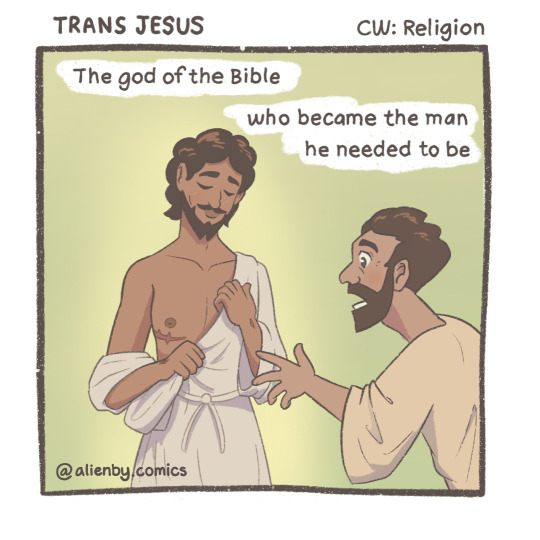


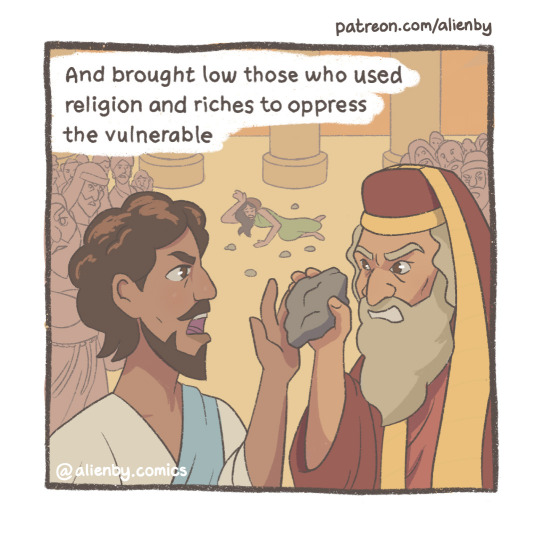




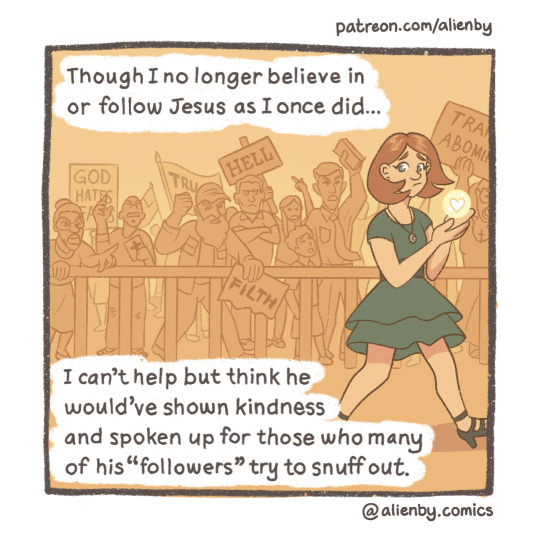

Here’s a link to a supplementary post: Jesus and Gender Non-Conformity in Christian Art
#cw religion#cw transphobes#trans artist#lgbtq comics#trans comic#transfem#queer comics#indie comics#trans comics#non binary artist#nonbinary#deconstructing christianity#deconstruction#deconversion#exvangelical#ex fundamentalist#trans day of visibility#easter
13K notes
·
View notes
Text
nobody knows • portgas d. ace
another drabble for sneaky link/ex boyfriend ace bc I have one functioning brain cell and all of it is focused on him atm teehee 🤭
wc: 1.8K
more infidelity (y’all both still AIN’T SHIT 😭 reader got that dog in her I’m sorry), straight porn, modern au, black fem reader, phone sex/sexting, squirting, oral sex, calls reader bitch, a eating + anal, recording, backshots, rough sex, heavy breeding, idk what else will come out
he’s so ooc in this and I don’t give a fuck (I’m ovulating and stressed w life + therapy is too expensive)
═✿══╡°˖✧✿✧˖°╞══✿═══✿══╡°˖✧✿✧˖°╞══✿══
nobody knows why you and ex-boyfriend!ace broke up in the first place. Honestly, it seemed like such a waste…three long years down the drain with nothing to show for it but the two of you left in shambles. Friends and family consoling you both as you learned to navigate life without one another. (Y/N), moving on fairly quickly with the son of one of your dad’s friends..a byproduct of military nepotism and the very antithesis to what Ace was. A stiff working a cushy desk job and reaping the benefits..pushing papers and always playing it safe. He was very kind, sweet and damn near ideal in every sense of the word. Not too much of a drinker, a partygoer or anything of the sort but he always took you on dates. All of your girlfriends liked him well enough, thinking that he more matched your speed than the thrill seeking, goofy, chaotic daredevil that was ex-boyfriend!ace. Who rode motorcycles and climbed mountains in his spare time, when he wasn’t holding life by the tips of his fingers as an EMT. Covered in tattoos, he looked like such a quintessential, stereotypical ‘bad boy’… “God, (y/n). I don’t know what you ever saw in that guy. He’s a loser, through and through.”
However, what nobody knows..is that you never truly left him alone! He was your ideal match and you couldn’t shake it. You could actually laugh, joke and make mistakes with him. There was no need for faux perfection and lies. You saw each other for who you really were.
Nobody knows that while you’re at work, he’s constantly sending you filthy messages to get you aroused and worked up. Making you chew your lip and the tip of your pen as you twirl in your chair..reading how he’s going to make sure you feel it in your stomach the next time you two link. Nobody knows he shamelessly sends you nut videos, uttering your name with the sexiest moans. Nobody knows that when you tell your assistant that the hour where you refuse any meetings is designated for you to choke on ex-boyfriend!ace’s cock in your cute little business attire..loving the way those glasses hang off the tip of your nose as he pushes your forehead to his pelvis.
“Goddamn, babe..I knew I couldn’t quit you..you’re eating my dick up so good.”
“It’d taste even better if you let me come on it first.”
loving that you were willing to abandon all of your morals for him so easily. Nobody knows about the second phone you keep stashed away in your glovebox just to call him late at night when your new man is sleeping or working overnight and you want some company..
“Can you please come over? I miss you..he won’t be back tonight. I promise.”
“Of course, baby. Anything for you..I’ll always come running when you tell me.”
or in need of a good orgasm because that dummy couldn’t give you one if you handed him a roadmap to the clit! With ex-boyfriend!ace on the other line talking you through it with that deep voice and lewd commands.
“Oh my gosh, pretty girl. Did you call me just so you could touch yourself to the sound of my voice? You’re so cute..” making you FaceTime him because he wants to see the mess he helped create.
nobody knows that whilst you're out at dinner with your new man, alongside loved ones as he boasts about how he knows you’re the one and how you guys make such a lovely couple, (y/n) is daydreaming about ex-boyfriend!ace riding you on the back of his Suzuki through the city, knowing the rush gets you turned on. That rather than dealing with an insecure little boy who felt intimidated by your looks and success, ex-boyfriend!ace would go drinking and partying with you, loving when you showed off your body because he wasn't worried about another man taking what was his. Nobody knows that you have a small tattoo of ex-boyfriend!ace’s name right above your private area. Hell, it's not as if your new man touched you enough to notice and when he did, the lights remained off.
When your girlfriends are divulging the dirt about their relationships and how envious they are of you. Claiming that you hit the jackpot with such a structured, well mannered guy who works a high paying job and always comes home to you. But what nobody knows…is that he could never replace the man you truly love. So much so, when you kiss him on the cheek that Friday evening before heading to the ‘airport’ for another business trip..you’re secretly meeting ex-boyfriend!ace in the top floor suite at a luxury hotel hours away from home where you two go every month to fuck each other's brains out for three days straight. Akin to addicts who can’t be satisfied, you rabidly devour one another until your bodies quit.
“I’ve waited all week for this…I’m so not sorry for how I’m about to fuck you.” ”I wouldn’t expect anything less.” Wrapping his hands around your throat, shoving his tongue into your mouth as he corners you against a wall. Nobody knows that ex!boyfriend!ace has you face down on a mattress with your ass up in the air as his tongue explores both of your entrances. Practically seating you on his face to suction around that clit, flicking his tongue in and out of your tight cunt before prodding your asshole, leaving a sloppy trail of saliva on each of them. Because you wore that adorable little heart shaped plug to help prep you for the weekend.
“You taste so fucking good…especially when I know you’ll let me have it anytime I want.”
nobody knows that you’re somewhere gripping the sheets for dear life as ex-boyfriend!ace delivers the most insane backshots you’ve ever felt. Those perfectly round, thick cheeks ricocheting off of his lower half..the contrast in your skin and that pearlescent scream surrounding his shaft making the sight even better…ripping orgasms from your body with no shame because he deserves it. After all, you belong to him.
“That’s right..come on this dick, bitch. Give me what I want..” he still loves and respects you all the same. But ace knows you prefer rough, degrading sex far more than the mundane and vanilla. Especially when it was in short supply with your current situation. Even going as far as to place a foot on your head, tugging your arms behind your back so that he can really bury his cock inside of you.
“Yes! Keep fucking meeee, just like that, daddy. ‘S so good!”
“You love when I dig you out like this, treating you like a little slut..’swear this pussy’s going to get me in some serious trouble one day. But I don’t care, I love you.”
rambling on as he feels you twitching around him for the third time, leaving splatters of warm juices each time; squirting immensely from the constant stimulation to your spot.
“Damn, you’re coming so hard, pretty girl. Is he not fucking you right?” Laughing before he could even get the very rhetorical question from his mouth. Leaning down to place a trail of pecks and licks on your spine to console you before placing you into a prone position. ”Of course not..nobody knows this body better than me. Isn’t that right, gorgeous?” All but confirmed by the way you’re tightening around him..he can’t help but to grip your throat and steal sloppy kisses from you whilst he drills you into the mattress. “Nooo, babyyy. You’re the only one who can fuck me this good..oh my Goddd—“ placing his camera in your face so that he could have it for safekeeping..(and in case he gets wind of your man running his mouth about him again!) Making you call his name and scream it to the heavens. “Aceeee, fuck meeee..”
Nobody knows that you’ve been fucking for damn near an hour while your phone buzzes with missed calls and texts from your boyfriend and whatever little girl he’s deciding to entertain for the moment. As heinous as it was, you were just filling the void and you’d always find your way back to each other. Perhaps it was the thrill of sneaking around that kept this charade going. Either way, you weren’t giving each other for a long time and it’s so obvious why..no one else will do the freaky shit that you both crave so much.
“Oh my gosh, I can’t believe you’re letting me fuck your ass again..feels amazing.” glaring up at him with the most adoring gaze in your eyes and smile on your face as you proudly hold a vibrator to your clit..allowing him to stretch that opposite opening. Practically coming on spot when you began to show your gratitude for this pleasure…
“Thank you, daddy..using all my holes like this. I love it so much.” That much apparent by the tears pouring down your face alongside that toothy grin. Only he could give it to you so good, you begin to cry!
“Oh shit..of course, gorgeous girl. I’d do anything for you..anything to see my baby smile.” Including pinning you down by your throat and letting trails of saliva drip into your mouth. Even feeding you a couple slaps when you all but pleaded with him to treat you like an object.
nobody knows that on the sparse occasions when you have sex with your current man, he’s forced to wear a condom because you’ve discussed several times that you don’t want children and you’re not taking any risks. But ex-boyfriend!ace gets the privilege of feeling that hard cock sliding in and out of you raw..and to breed you as many times as he can muster! Letting load after load spill into your aching womb. Filling every hole with that dripping seed.
“You look so pretty stuffed with my cum, sweetheart. Just how I like it.”
nobody knows why you left ex-boyfriend!ace in the first place but you knew why you’d always come running back!
@violetxxvenom @shamelesshoefairy @lwop-kpop
#cherry’s works ✦⭒#black fem reader#portgas d ace#portgas ace x reader#portgas d ace x black reader#ace x black reader#one piece#one piece x black!reader#one piece x reader#one piece x black reader#black reader#portgas ace x y/n#portgas ace x you#portgas ace smut#one piece modern au#one piece fanfiction#one piece smut#op smut#ace headcanons#fire fist ace#op headcanons#ace drabble#one piece drabble#cw toxic relationship#cw infidelity#cw cheating#ex boyfriend ace is my new religion goodbye#cw smut#this is pure filth I’m so sorry 😭#hope y’all like it though
373 notes
·
View notes
Note
Kitty I’ve been thinking about being a devout Catholic Soap, you’re engaged and the wedding is just around the corner but you’ve both been so keyed up
While I can see giving him head, I love the idea of being turned into an anal lover, because that was the only other hole he’d touch. Love the idea of getting married while his load is oozing down your thighs from your sloppy, ruined rim 😋
Y’know I know this is predominantly a Mormon thing but imagine soap trying to do soaking
For anyone who doesn’t know, it’s basically cockwarming— it follows the loophole that it’s not actually sex if we don’t move. Then there’s jump-humping— where you get someone to like jump up and down on the bed next to you so there is movement but it’s not being generated by you so it’s not a sin.
Like his self control is out the window it’s not strong enough for that
CONVERSELY imagine soaking with soap and someway, somehow, he gets Ghost in on this farce. And Ghost thinks this is all stupid as hell, but Soap is gonna have him as the best man at your wedding, so he feels like he should be at least a teeny bit tolerant.
Anyways. Imagine being sat down on Soap’s cock, while ghost is the one rubbing your clit and drawing moans from you. The stimulation makes your pussy twitch and squeeze around soap, and that combined with the knowledge that he’s in your pussy right now is enough. You get coaxed to orgasm, and the squeeze of your cunt pushes soap over the edge as well, Ghost pulling you up by the hips in the nick of time so that his cum just paints your mound instead of your insides
And Simon helped you both get yours, so it’s only right that you suck his cock while Johnny has you by the hair, pushing you down and holding you there cause “it’d be fockin rude not tae treat m’best man to m’bride’s tight little pussy of a throat, aye?”
#writing#cod fanfic#cod#john soap mactavish#simon ghost riley#john soap mctavish x reader#soap x reader#simon ghost riley x reader#ghost x reader#cw religion
281 notes
·
View notes
Text


i want to print these screenshots out en masse and post them onto evangelical church doors like they're the 95 theses
#religion cw#the amazing digital circus#tadc#tadc spoilers#pomni#kinger#progressive christianity#lgbtq christian#queer christian
750 notes
·
View notes
Text

3.27.25
189 notes
·
View notes